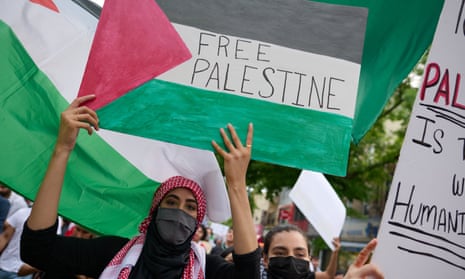Facebook’s often inscrutable content moderation process has come under renewed fire during the 11-day bombardment of Gaza after hundreds of pro-Palestine posts were removed, many without explanation.
Nearly 500 removals on Instagram and Facebook were documented by 7amleh, a Palestinian digital rights non-profit, between 6 and 19 May. Now, 7amleh and more than 30 other human rights organizations are calling for greater transparency into the social network’s decision making, especially as it relates to Palestine as part of a campaign titled Facebook, We Need to Talk.
In response to the report, the US congresswoman Rashida Tlaib has authored a letter to top social media platforms demanding more information about why certain Palestinian content was taken down in recent weeks. “I cannot understand how Facebook can justify censoring peaceful Palestinian voices while providing an organizing platform for extremist hate,” she wrote.
The groups say the decisions of Facebook and other tech firms amount to “censorship” of Palestinians, and that the company’s opaque decisions raise troubling questions about private companies acting as mediators of what information comes out of a war zone, where social media is often the only platform for sharing information.
“This censorship has been happening before this most recent crisis, and will continue to happen,” said Nadim Nashif, the executive director of 7amleh. “We are asking for more transparency in content moderation – this is not enough.”
In recent weeks, users globally reported the deletion of hundreds of posts condemning the eviction of Palestinians from the Sheikh Jarrah neighborhood of Jerusalem, in many cases without warning or explanation. Instagram on 5 May briefly suspended the account of Mona al-Kurd, a young Palestinian woman whose confrontation with an Israeli settler went viral. The platform also removed a number of Instagram posts regarding the killing of Saeed Odeh, a 16-year-old Palestinian, screenshots shared with the Guardian showed. In other cases, Palestinian artists and activists saw their posts removed and accounts suspended without explanation.
“It feels very obvious that there is targeted censorship of Palestinian voices and experiences,” said Alia Taqieddin, whose event on Facebook advertising a solidarity march for Palestine in Seattle, where she lives, was removed without warning or explanation last week.
As the dust settles amid the ceasefire, human rights organizations are taking a fresh look at how social media companies made decisions during a crisis, saying ongoing violence in the region underscores the importance of a postmortem. 7amleh also aimed critiques of censorship at Twitter, where 55 cases of Palestinian content being removed were reported.
“It is especially frustrating because Instagram and Twitter are serving as the main platforms where Palestinians experiencing violence in Palestine are sharing what is happening on the ground,” Taqieddin said. “It makes me very concerned how we will get accurate, first-hand information in a crisis.”
In a letter to Facebook’s chief operating officer, Sheryl Sandberg, organizations including Jewish Voice for Peace, the digital rights group Fight for the Future and the National Lawyers Guild called on Facebook to “stop censoring Palestinians” on all its platforms and provide transparency as to how Facebook moderates this content.
“It is becoming clear that just a handful of companies hold the ultimate power over speech in these situations,” Jillian C York, a free speech activist with the Electronic Frontier Foundation who has been monitoring censorship in Palestine.
She added that social media have become even more important because mainstream media outlets are often blocked from covering events on the ground in Palestine.
“When companies place restrictions on what people can say, we’re missing out on the reality of what’s happening on the ground,” York said. “We’re only able to get one side of that narrative.
The groups are also calling on Facebook to comment on the nature of its relationship with the Israeli government, with which it has worked in the past to monitor posts that incite violence.
Representatives from the Israeli government did not respond to request for comment regarding the nature of its relationship with Facebook. A spokesman for Facebook told the Guardian that the “established process for government requests is the same around the world”.
“Each request is reviewed based on Facebook’s policies, local laws and international human rights standards,” he said. “We’re transparent about how many pieces of content we restrict in each country in our Transparency Report, which we publish twice a year.”
Nick Clegg, Facebook’s vice president for global affairs, virtually met with Palestinian Prime Minister Mohammad Shtayyeh in a virtual meeting on Tuesday, where he apologized for the company mistakenly labeling some posts as incitement to violence.
The spokesman for Facebook acknowledged there have been a number of recent glitches affecting the ability to share content on Facebook and Instagram, including an error that temporarily restricted content from being viewed on the al-Aqsa mosque hashtag page. He said Facebook had a “dedicated team” including Arabic and Hebrew speakers closely monitoring the situation on the ground.
“While these have been fixed, they should never have happened in the first place,” the spokesman said. “We’re so sorry to everyone who felt they couldn’t bring attention to important events, or who felt this was a deliberate suppression of their voice. This was never our intention – nor do we ever want to silence a particular community or point of view.”
